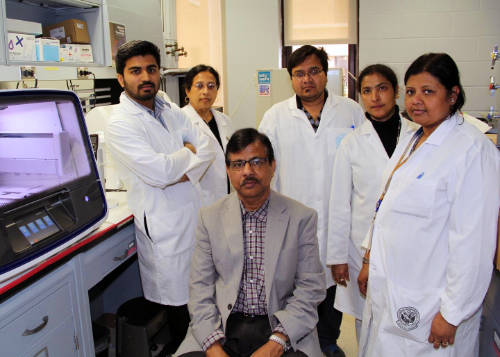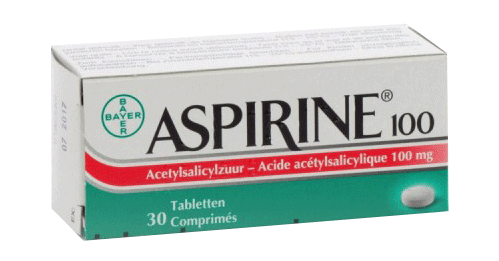Aspirine tegen borstkanker
Geplaatst door Jos ma, november 16, 2015 11:27:42
Aspirine zou het ontstaan van borstkanker kunnen tegengaan. Dat blijkt uit een nieuwe studie van de universiteit van Kansas.
 Uit
een nieuwe studie blijkt dat een dagelijkse dosis aspirine de groei van
borstkanker zou kunnen tegengaan. In het verleden werden gelijkaardige
bevindingen al gerapporteerd voor darm- en prostaatkanker. Dit komt
omdat aspirine ervoor zou zorgen dat de omstandigheden in het lichaam
-en dan vooral rond de kankercellen- niet bevorderlijk zouden zijn voor
de aangroei van van nieuwe kwaadaardige cellen. Aspirine zou daarom
vooral handig van pas komen bij patiënten die eerder al met de ziekte te
maken kregen. Oncoloog en researcher Sushanta Banerjee van de
universiteit van Kansas zegt daarover: “Nadat een patiënt succesvol is
behandeld tegen borstkanker, is het goed mogelijk dat de ziekte na vijf à
tien jaar weer de kop opsteekt. Kanker heeft namelijk stamcellen die
chemotherapie kunnen overleven. De cellen blijven op non-actief, tot de
omstandigheden in het lichaam weer gunstiger zijn om zich opnieuw te
beginnen reproduceren. Wanneer dat gebeurt kunnen ze snel uitgroeien tot
erg agressieve tumoren.” Uit de experimenten van dokter Banerjee bleek
dat een groot percentage van de kankercellen die werden blootgesteld aan
aspirine afstierven. De rest kon zich niet reproduceren. “We kunnen
aspirine bij de behandeling van kanker dus op twee manieren gebruiken”,
gaat Banerjee verder. “Langs de ene zijde kunnen we aspirine geven na
chemotherapie, om zo hervallen te voorkomen. Langs de andere zijde
kunnen we aspirine ook preventief gebruiken.” Toch is het aan te raden
om eerst een dokter te raadplegen, alvorens je een dagelijkse dosis
aspirine begint te nemen. Aspirine verdunt namelijk het bloed, en
verhoogt het risico op gastro-intestinale bloedingen.
Uit
een nieuwe studie blijkt dat een dagelijkse dosis aspirine de groei van
borstkanker zou kunnen tegengaan. In het verleden werden gelijkaardige
bevindingen al gerapporteerd voor darm- en prostaatkanker. Dit komt
omdat aspirine ervoor zou zorgen dat de omstandigheden in het lichaam
-en dan vooral rond de kankercellen- niet bevorderlijk zouden zijn voor
de aangroei van van nieuwe kwaadaardige cellen. Aspirine zou daarom
vooral handig van pas komen bij patiënten die eerder al met de ziekte te
maken kregen. Oncoloog en researcher Sushanta Banerjee van de
universiteit van Kansas zegt daarover: “Nadat een patiënt succesvol is
behandeld tegen borstkanker, is het goed mogelijk dat de ziekte na vijf à
tien jaar weer de kop opsteekt. Kanker heeft namelijk stamcellen die
chemotherapie kunnen overleven. De cellen blijven op non-actief, tot de
omstandigheden in het lichaam weer gunstiger zijn om zich opnieuw te
beginnen reproduceren. Wanneer dat gebeurt kunnen ze snel uitgroeien tot
erg agressieve tumoren.” Uit de experimenten van dokter Banerjee bleek
dat een groot percentage van de kankercellen die werden blootgesteld aan
aspirine afstierven. De rest kon zich niet reproduceren. “We kunnen
aspirine bij de behandeling van kanker dus op twee manieren gebruiken”,
gaat Banerjee verder. “Langs de ene zijde kunnen we aspirine geven na
chemotherapie, om zo hervallen te voorkomen. Langs de andere zijde
kunnen we aspirine ook preventief gebruiken.” Toch is het aan te raden
om eerst een dokter te raadplegen, alvorens je een dagelijkse dosis
aspirine begint te nemen. Aspirine verdunt namelijk het bloed, en
verhoogt het risico op gastro-intestinale bloedingen.
Bron: HLN Research:
Daily aspirin could block growth of breast, other cancer, May 21, 2015
Dr. Sushanta Banerjee (seated) is seen with his research team (from left): Samdipto Sarkar, Dr. Snigdha Banerjee, Dr. Amlan Das, Archana De, and Dr. Gargi Maity. (Photo by Tony F. Barnett)”
 Take
two aspirin and call me in the morning” has been the punchline for
countless jokes. Could it also be good advice for cancer patients? A new
study published online in Laboratory Investigation on April 13, 2015,
found that a daily dose of aspirin was effective at blocking breast
tumor growth. Previous studies have already shown a similar effect on
colon, gastrointestinal, prostate, and other cancers. The trick, says
Dr. Sushanta Banerjee, research director of the Cancer Research Unit at
the Kansas City (Mo.) VA Medical Center, is to ensure conditions around
cancer stem cells aren’t conducive for reproduction, something aspirin
seems able to do. “In cancer, when you treat the patient, initially the
tumor will hopefully shrink,” says Banerjee. “The problem comes 5 or 10
years down the road when the disease relapses.” Cancer has stem cells,
or residual cells.
Take
two aspirin and call me in the morning” has been the punchline for
countless jokes. Could it also be good advice for cancer patients? A new
study published online in Laboratory Investigation on April 13, 2015,
found that a daily dose of aspirin was effective at blocking breast
tumor growth. Previous studies have already shown a similar effect on
colon, gastrointestinal, prostate, and other cancers. The trick, says
Dr. Sushanta Banerjee, research director of the Cancer Research Unit at
the Kansas City (Mo.) VA Medical Center, is to ensure conditions around
cancer stem cells aren’t conducive for reproduction, something aspirin
seems able to do. “In cancer, when you treat the patient, initially the
tumor will hopefully shrink,” says Banerjee. “The problem comes 5 or 10
years down the road when the disease relapses.” Cancer has stem cells,
or residual cells.
These cells have already survived chemotherapy or other cancer treatment and they go dormant until conditions in the body are more favorable for them to again reproduce. “When they reappear they can be very aggressive, nasty tumors,” he says. Study used cells and mouse models
To test his theory that aspirin could alter the molecular signature in breast cancer cells enough that they wouldn’t spread, Banerjee, also a professor at the University of Kansas Medical Center, used both incubated cells and mouse models.
For the cell test, breast cancer cells were placed in 96 separate plates and then incubated. Just over half the cultures were exposed to differing doses of acetylsalicylic acid, commonly known as aspirin. According to Banerjee, exposure to aspirin dramatically increased the rate of cell death in the test. For those cells that did not die off, many were left unable to grow. The second part of his study involved studying 20 mice with aggressive tumors. For 15 days, half the mice were given the human equivalent of 75 milligrams of aspirin per day, which is considered a low dose.
At the end of the study period, the tumors were weighed. Mice that received aspirin had tumors that were, on average, 47 percent smaller. To show that aspirin could also prevent cancer, the researchers gave an additional group of mice aspirin for 10 days before exposing them to cancer cells. After 15 days, those mice had significantly less cancerous growth than the control group. Potential use as both treatment and preventive measure “We found aspirin caused these residual cancer cells to lose their self-renewal properties,” says Banerjee. “Basically, they couldn’t grow or reproduce. So there are two parts here. We could give aspirin after chemotherapy to prevent relapse and keep the pressure on, which we saw was effective in both the laboratory and the mouse model, and we could use it preventatively.”
 Experts
suggest patients consult with a doctor before starting a daily aspirin
regimen. The drug is known to thin the blood and increase the risk of
gastrointestinal bleeding. “Of course there is a risk,” says Banerjee,
“but you have to weigh that against the risks of cancer. It’s true this
is relatively new and we don’t know all the side effects yet, but this
was a very low dose.” Nevertheless, Banerjee is taking his own medicine.
For three years he has been on a daily aspirin regimen with, he says,
no ill effects. Each person, he stresses, should of course check with
his or her own health care provider before doing the same. Source:
http://www.research.va.gov/currents/spring2015/spring2015-25.cfm
Experts
suggest patients consult with a doctor before starting a daily aspirin
regimen. The drug is known to thin the blood and increase the risk of
gastrointestinal bleeding. “Of course there is a risk,” says Banerjee,
“but you have to weigh that against the risks of cancer. It’s true this
is relatively new and we don’t know all the side effects yet, but this
was a very low dose.” Nevertheless, Banerjee is taking his own medicine.
For three years he has been on a daily aspirin regimen with, he says,
no ill effects. Each person, he stresses, should of course check with
his or her own health care provider before doing the same. Source:
http://www.research.va.gov/currents/spring2015/spring2015-25.cfm
Verder lezen: Cafe de Spanjaard
Reacties
Een reactie posten